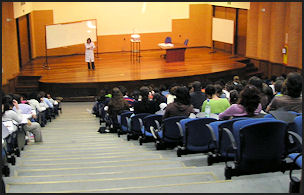
“ANOTHER lecture about computational fluid dynamics… UGGG!”
What is the rationale or reason for the training program you’re taking? What will the participants and the organization providing the training get out of the training program? These are just some of the high level training and development questions you should be asking yourself every minute you’re in the class.
The stated reason for the training program should explain why a person would enroll for that type of training and explain what the result of the training was likely to be. Of course, they tend to be very general, but you should have enough information to guide your progress through the rest of the course. Here are some more questions to get your mind going.
Keystone T & D Questions
- What is the reason for this training program?
- Is it required for specific types of work?
- Are there unique skills needed to excel at this special work?
- What area of learning is the target; skills, behavior or knowledge?
- Does this program modify behavior, inform and impact emotions or feelings?
- Will this training program teach skills that require practice to refine and can performance be measured?
Why Your Answers Matter
Obtaining the answers to these questions, regardless of how the data has been acquired, will clarify why the training program is being developed. The answers define the overall goals of the program. This is important because overall goals are usually able to be separated from specific learning goals and you need to know what you’re learning before you just jump in.
As an example, a reason for a training program might be to improve company management effectiveness. The learning goals might specifically be improvement in the ability to listen better or be effective in group communication skills.
It is important that those planning the training program make sure that all participants are actively engaged, because they feel included in both the overall goals and the differentiated learning goals. Making sure all participants feel they are part of the program for a good reason could also be one of the stated overall goals.
It is also important that the reason for the training program is kept clearly in focus because as the development of the program proceeds it can happen that overall goals tend to mutate as various decisions are made as relates to training and input is received from training participants.
Defining the Objectives of Learning

Okay, okay. So objectives aren’t just hoops to jump through, but this picture cracked me up!
The following questions, relating to objectives for learning, should be considered and kept in mind as the training program is in the planning phase. The following are questions about learning objectives to consider as you plan your training program.
Planning Questions: These need to be thought out early in the planning process.
- What is the desired and expected training outcome?
- What will participants be able to do at the end of this training program?
Additional Important Questions to Consider
- What is the definition of satisfactory completion of this training program?
- What skills, experiences and knowledge are the foundation of the program?
Both of these types of questions are meant to help focus the thinking process and lead the development of the program past the design phase and into the planning of training delivery. Knowing where you (and the rest of the people involved) fit on the learning curve makes this entire process that much easier.
Keep Asking and Keep Finding
Other training and development questions to consider are how often this training program will be offered and will that be on a set schedule or randomly called up when it is felt it is needed? Finally, how will the training program be kept up to date, and who will be responsible for that task?
You see where all of these questions are going? The main point here is to keep your mind focused on getting the most out of the good work you are putting into your time doing the training. The ultimate level of development is when you understand the material and know how to apply it to your life. Ask the right questions and you’ll get the right answers.